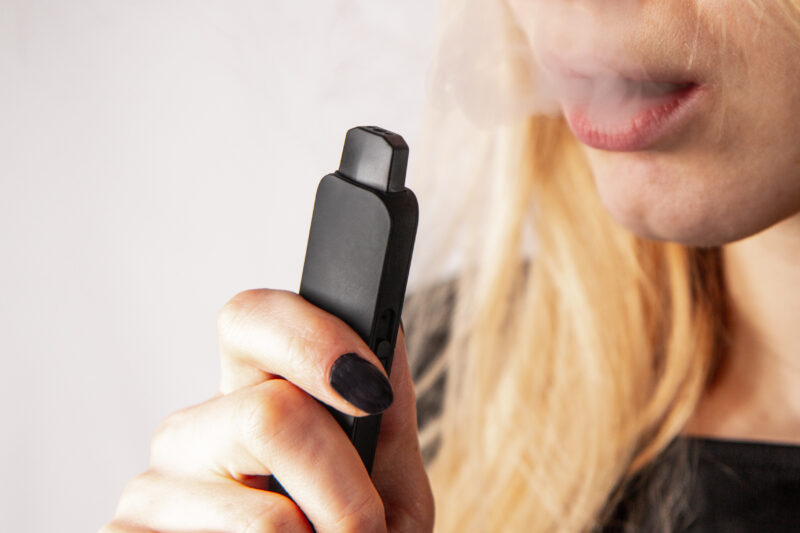Capitalism vs. nicotine: No real winner in this debate
I don’t drink vodka straight up. This is because I don’t find the flavor that pleasant on its own. Throw in some olive juice, vermouth and an olive or three, and I’m delighted; a martini tastes good.
Sometimes, too, on a summer day when I’m mowing the lawn and working on my tan and age spots, I’ll have one of those cocktails in a can, or a High Noon, or some other fruity alcohol item. These are also delicious. They’re also not for children, or teenagers, or anyone under 21. And I’d be sad if they were against the law.
I don’t vape nicotine, but I imagine it doesn’t taste very good. I bet the fruit-flavored and menthol ones taste a lot better. Maybe delicious wouldn’t quite be the word for it, but this is where I’m going: those flavors make something addictive more palatable. Adding flavors to alcohol also makes something addictive more palatable. People under 21 are prohibited by law from having both alcohol and nicotine products, so I’m feeling a little unsettled about a bill coming from the Senate into the House this coming session. I’m not sure how I want to vote.

S.18 (the S in front means it was introduced in the Senate) is an act relating to banning flavored tobacco products and e-liquids, the liquids used in vaping. This not only applies to fruity stuff, but also to menthol flavors as well. The driving factors behind wanting to ban these products are healthcare costs to taxpayers, the addiction and health issues they cause in legal users, and their popularity among teens and young people who use them proportionally more than they do non-flavored tobacco products. Teens don’t smoke cigarettes that much anymore, but many of them use e-cigarettes, also known as vapes.
I don’t think anyone under 21 should be allowed to purchase these, just as I don’t think anyone under 21 should be allowed to purchase alcohol. The public health and safety issues associated with younger people using these products are significant. Nicotine addiction is tough to beat, and their brains and bodies are developing so rapidly into adulthood in their teen years that adding any chemical or dependency into their systems is really, really bad.
And yet … capitalism. The slippery slope of banning things makes me uncomfortable. Like, you know what else is bad for me? Cheetos. But I love them, and I don’t want them to be banned, even though I almost never buy them. I still want to know they’re out there if I need them. Just as it’s the Cheeto Cheetah’s right to be a cartoon character selling iridescent orange snacks, it’s the legal right of vape companies to make and sell those products. (For the record, I don’t think at all that cartoon characters should be able to sell nicotine.)
On the other hand, I have three teenagers. They’re angels and are perfectly behaved at all times, but should they decide to dabble in flavored tobacco products, or God forbid get addicted to nicotine, I would be really, really worried and stressed. And I wouldn’t want them to be able to get their hands on those items. Excluding my children, of course, teens aren’t always well known for their impulse control or decision-making skills, so if those products weren’t available to them and their peers in the stores, then it would most likely lead to lower consumption rates and better health and safety outcomes for those kids who need guidance and protection.
Teens and tweens are under so much pressure right now and the potential to use addictive and harmful forces in their lives is strong; even social media has its addictive properties and can cause mental and physical health challenges. The last thing we need are yummy tobacco products that will further impact their mental and physical health with all of the side effects that come along with addiction.
Statutes already exist that impose fines on people who sell tobacco products to underage consumers. Tobacco licenses can be suspended or revoked from establishments that break those laws. Age identification is required for purchases, and fines and community service penalties apply to people under the age of 21 who attempt to use fake IDs to buy tobacco or alcohol. If these statutes aren’t working, then perhaps they should be more rigorously enforced or changed to make the consequences more significant.
It’s hard for me to justify believing in banning one thing but not all the other things, even when that one thing is bad for anyone who uses it. Who’s to decide where the line is? I guess it’s your state and federal governments’ collective jobs to decide. After I just argued with myself for eight paragraphs, I’m really wondering: What do you think? I’m happy to hear from you any time via text or phone call at 917-887-8231 or email.
